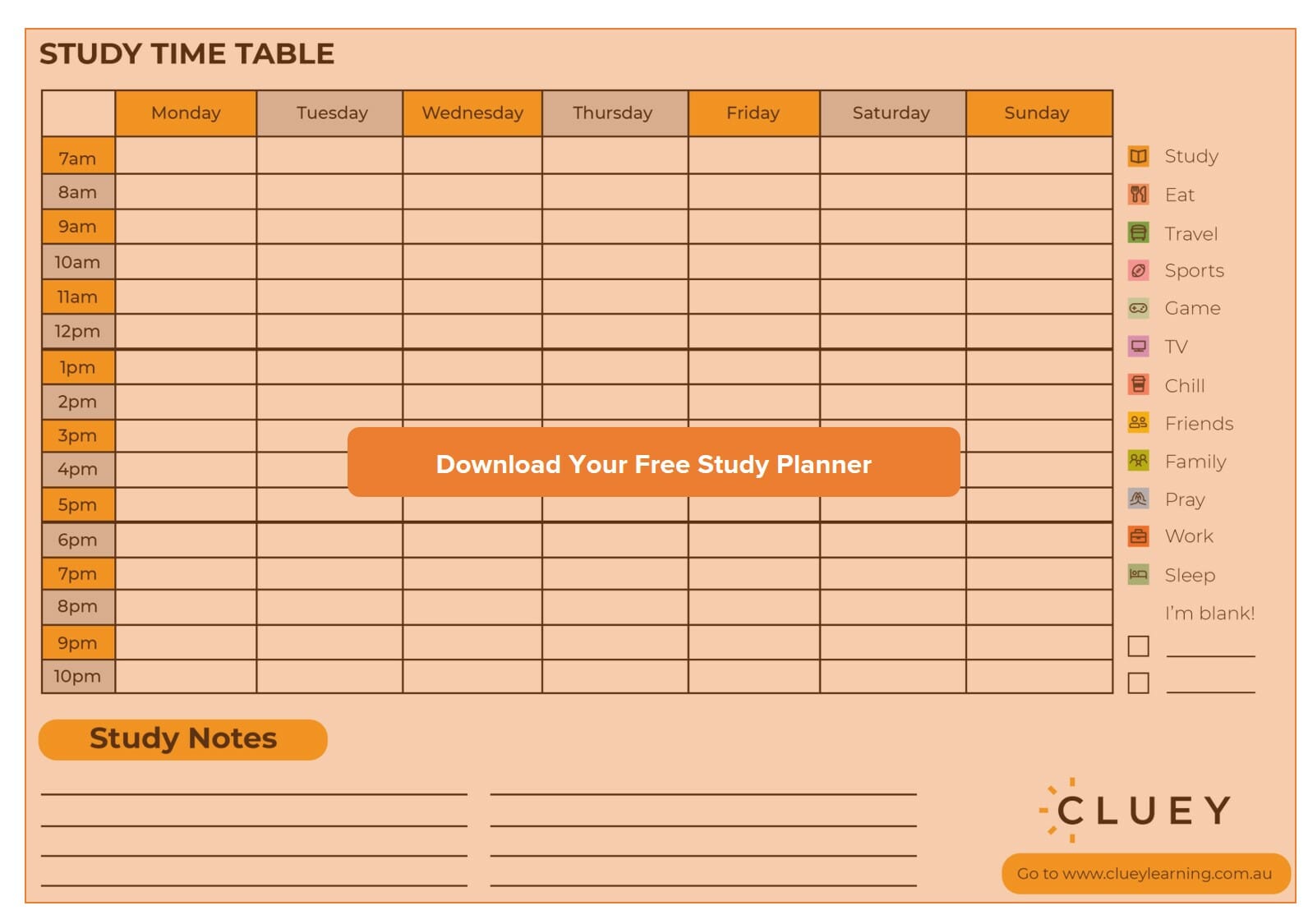The key to doing well in exams and achieving your academic goals is working smart and putting the hard yards into your studies. But what most students find difficult is not necessarily the study itself, but finding the time and creating the right habits.
So how do you develop the right study practices to return the best marks? Here we explore the top tips, tricks and strategies that every student can implement to improve their study techniques.
Getting started
Developing a plan is often the most difficult part of a study routine. With most of us leading busy lives, there’s no surprise that many students find it difficult to actually start studying, especially when it comes to balancing schoolwork with part time employment, family life and social activities. So how should you begin?
Getting started with successful study habits often comes down to a good routine. Whether you’re a morning person or a night owl, it’s important to cater to these needs to ensure maximum productivity. This might take the form of waking up early to get in 30 minutes of study before school, or staying up later than your usual bedtime.
If you find it difficult to study at home, it may be a good idea to explore other settings, such as the local library, your school, or even a café. Finding the appropriate learning environment can have a significant impact on how you study and the level of productivity and focus you can achieve.
It’s also key to ensure that you’re breaking down your material for each study session. It’s easy to become overwhelmed with the sheer amount of content that needs to be revised. Separating sections or topics into different slots will help to avoid this issue. Tackling smaller amounts of study also gives you the opportunity to learn the content more thoroughly.
Being strict with yourself and sticking to set study sessions is the best start to successful studying. The habit of studying at the same time every day or week will allow you to build a rhythm. This also ensures that you’re not cramming all of your study into the days before exams.
Using the right resources not only makes revision easier, it also helps you develop and refine your skills. A well-developed study timetable is one of the most resourceful assets for keeping track of tasks.
Study timetable
Most students have heard of a study timetable, but many don’t necessarily understand how to use it to their benefit. A study timetable is a structured schedule that allows you to drop your study times, classes, events and any other important occasions into one place.
Study timetables are incredibly useful as they allow you to visualise what you have coming up in your day or week. Further, it ensures that you don’t forget upcoming assessments, exams or events. Having a visual representation of the week ahead will allow you to prepare and schedule your study sessions appropriately.
All students are busy, but there’s nothing worse than cramming a full term’s worth of content in just a few weeks (or worse, days) of study, or completing assessments the night before, simply because the due date was forgotten. A study timetable will hold you accountable for your deadlines and your learning goals.
Most importantly, remember to be flexible. It’s easy to become stressed or wander off track if you miss one study session or if your timetable doesn’t go to plan. If this occurs, make some adjustments and start again.

How to create a study timetable: 5 Step Plan
Creating a study timetable can be quite difficult if you’re not sure what you’re doing. Here’s a five-step guide on how to develop your own study timetable.
1. Analyse your current schedule
The best way to begin is to analyse how and where you’re spending your time. This will identify your priorities, how many hours you can devote to studying, and create a timeline for reaching your goals. Mapping out your schedule will allow you to see where you’re spending most of your time, and if you’re dedicating too many hours to one activity.
2. Set goals
Reflecting on your academic goals will allow you to determine the number of hours you need to spend studying. Students who are hoping to achieve top scores might look to schedule in more study hours compared to those who may just want to pass. This will change depending on your year group and subject selection, also.
3. List deadlines and other important dates
Before you begin with a study timetable, it’s essential to identify deadlines and any important social outings you might have. Recognising these and noting them down before you create your study timetable will help make the process a lot smoother. It also means that you won’t schedule important study sessions or assignment prep during a school camping trip or leading up to a formal.
4. Decide on a format
There are various formats study timetables can take. Although many people opt for a physical copy of their study timetable, there are some students who prefer an online, shareable format. Both paper and digital timetables have their advantages. A physical copy is easier to personalise, and more noticeable and imposing when hung in a study area. On the other hand, a digital timetable may be easier to set up and is more easily accessible. Whichever format you choose, it should be one that you’re comfortable with and see yourself using often.
5. Schedule in your classes, study sessions and extracurricular activities
Scheduling your classes and extracurricular activities into your timetable will allow you to physically see where you can fit in your study sessions. You may be surprised to see that you’re spending the majority of your time each week at school or on the soccer field, leaving you with limited time to study on Sundays. As part of this process, it’s also important to schedule in time to rest and relax. There’s no doubt that studying hard will lead to results, but studying hard without giving yourself breaks can lead to burnout. A healthy balance is always recommended.
Creating your own study timetable can be time consuming, and for busy students, this isn’t always an option. If you’re looking for the right study timetable for you, you can download our universal study timetable then customise it to your needs and learning goals.
How To Study More Effectively: Top Tips
Aside from things like a study timetable to help you achieve your academic goals, there are many study tips that you can apply to help with academic success.
1. Be an active learner
Becoming an active learner in the classroom and at home can help you grasp concepts and may even reduce the amount of time you need to spend studying. Instead of reading over your class notes during your study session, opt for answering questions, testing yourself or teaching someone else what you’re learning about.
2. Find the right study environment
Finding the right study environment is just as important as finding the right study method. The characteristics of a good work environment include limited distractions, as well as a space that improves your productivity and allows you to focus. Other factors, such as sound and smell can impact your study environment. Without the right setting, your ability to retain information plummets.
3. Block social media
Internet-enabled devices have proliferated over the past few years, offering easy distractions for students everywhere. To maximise your productivity during a study session, consider disabling your social media accounts or placing your phone in a ‘blackout’ box for short periods.
4. Keep healthy – eat, sleep and move
During busy periods of study there never seems to be enough time for the basic things, such as sleeping, eating and exercising. However, as important as study is, it’s equally important to take care of yourself. Having good health, high levels of energy and keeping stress levels down are going to significantly contribute to your overall success.
5. Take advantage of feedback
Feedback can be a truly valuable tool for improvement. This sort of constructive criticism not only encompasses what you did wrong, but offers insight into areas upon which you can improve. If anything, feedback is a guide that can direct you towards the topics you should be spending more time reviewing.
6. Find a good study partner
Having a study partner can be more effective than studying alone. You can bounce ideas off a study partner, while making room for different perspectives. It also provides a support system and, most importantly, holds you accountable for your goals.
7. Focus on time management
It is important to make sure you have clear time management for your projects. You don’t want to focus all of your study on only one topic so it’s important to diversify your sessions to cover multiple areas.
Five study mistakes to avoid
With so much talk of tips and tricks to achieve study success, we thought we’d list a few study faults and faux pas to avoid.
1. Listening to music
If music is a distraction for you then make sure you find a quiet spot. Sure, some people actually find music conducive to concentration, but it’s important to be honest with yourself if this doesn’t sound like you. Also important to note, having a bit of light music in the background if it helps you study is not the same thing as leaving the TV on.
2. Multitasking to increase productivity
Set clear study to-do lists for projects and try to work through them one by one. Working on multiple tasks at the same time might cause you to lose focus, become overwhelmed, or underperform.
3. Cramming
Set a regular study schedule, plan for your deadlines, and don’t leave your work or revision until the very last minute. You might think that cramming is the best way to keep your knowledge fresh, but this increases your stress levels and decreases the likelihood that your brain will retain key details.
4. Overdoing the study
Remember to take regular breaks because studying for too long or too often will lead to almost certain burnout. Try to find a nice balance, whether that means time with your friends, sporting activities, or simply sitting on the couch and vegetating.
5. Reading as study
Don’t just read your notes. Instead, try to highlight or underline key passages, make new notes, draw diagrams and bookmark important parts of your textbook. Try to really understand the information as you read it.
Need more help preparing for exams?
Creating a study planner and implementing our top study tips can help you fulfil your academic potential. But sometimes you need some extra help.
Our personalised online learning platform and expert tutors can help you with specialised exam prep or to target areas in which you might be struggling. What’s more, Cluey tutors are 100% online, which means you can work whenever and wherever you like.
So whether your goal is to ace your exams, keep up or catch up, Cluey Learning has a programme to help.
Contact us today below to find out more.




